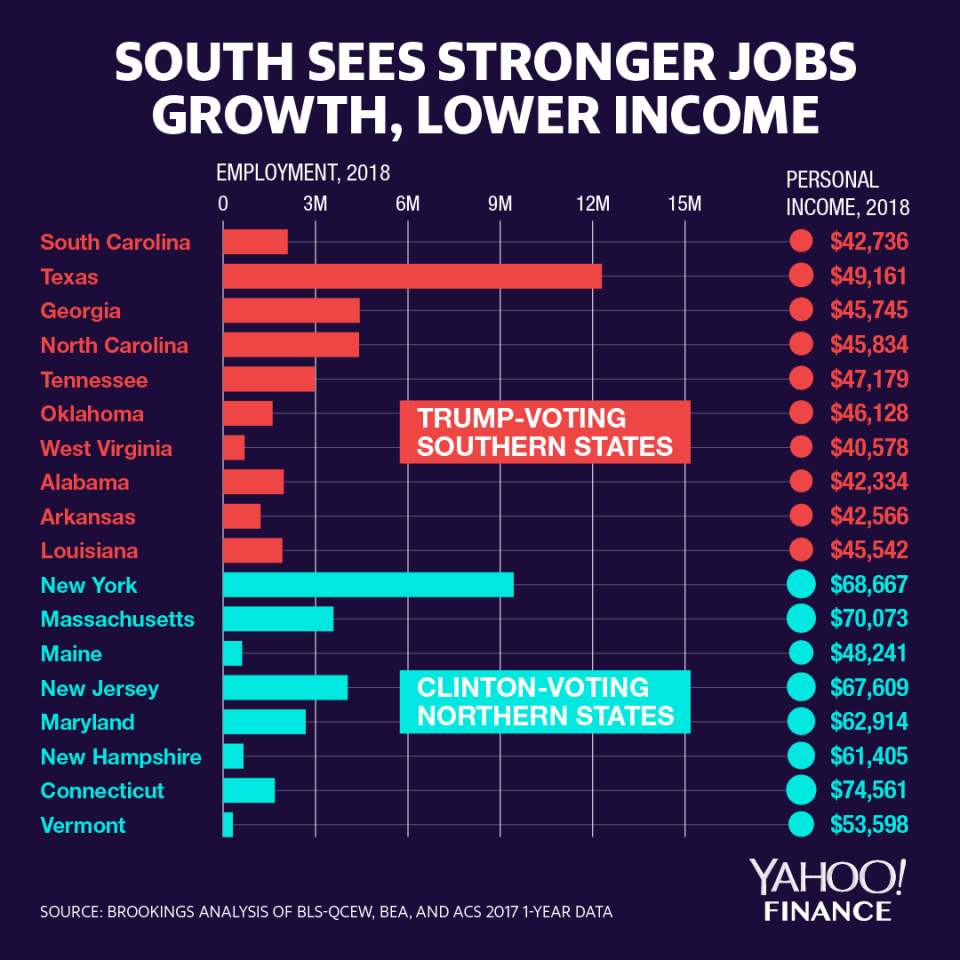Southern states that voted for Trump see lower incomes than rest of U.S.
Since President Trump took office, Southern states have seen stronger employment growth than Northeastern states that voted for Hillary Clinton.
But the positive job growth masks a grim reality: Southerners are seeing lower wages and earning less than the rest of the country.
During Trump’s administration, personal income in the South has grown by 1.7% a year, trailing Clinton-voting Northeastern states that have grown by 2% over the same period. And in 2018, personal income in Southern states was lower than the rest of the country. The average income earned per person in Texas was $49,161; $45,834 in North Carolina; and $37,994 in Mississippi, according to the Bureau of Economic Analysis.
“That’s the story of the South. It’s still adding jobs a little bit faster, but income growth is slower,” Mark Muro, senior fellow and policy director at the Brookings Institution’s Metropolitan Policy Program, told Yahoo Finance. “What I think has happened since 1980, the economy has become more and more digital, and thereby more and more rewarded education, well-skilled, technical workers, college graduates. The South has less of those.”

The share of adults with a bachelor’s degree in the southern states that voted for Trump is significantly lower than the rest of the country – 28.2% vs. 33.2%.
How people feel about the economy and their own financial situation factors into how they vote, which could spell trouble for Trump’s reelection efforts. “There’s a lot of evidence that the trend on personal income is what most determines political behavior. Forthcoming data is going to show a slowing of the economy and that may be badly timed for Trump’s re-election,” says Muro.
Employment growth
Although personal income in the South is below the rest of the U.S., it has seen better job growth by offering lower incomes and investing less in education, according to Brookings.
“This reflects the fact that the South created an economic miracle by committing to being a low-cost, low-regulation area. Low-cost growth was the name of the game,” says Muro.
Southern states saw job growth of 1.8% a year since 2010, according to Brookings, compared with 1.6% for the rest of the U.S. during that time.
Since Trump has been in office, employment in the South grew at nearly 2% per year, compared with the rest of the country which grew at 1.5%.
Follow Sibile Marcellus on @SibileTV
More from Sibile:
Trump is to blame for strong dollar, not the Fed: Economist
Trump ‘is playing with fire’ as more tariffs are threatened: JP Morgan
How U.S. importers are avoiding Trump’s tariffs
New Trump tariffs would affect nearly 70% of consumer goods: Citi
Read the latest financial and business news from Yahoo Finance
Follow Yahoo Finance on Twitter, Facebook, Instagram, Flipboard, LinkedIn, YouTube, and reddit.
